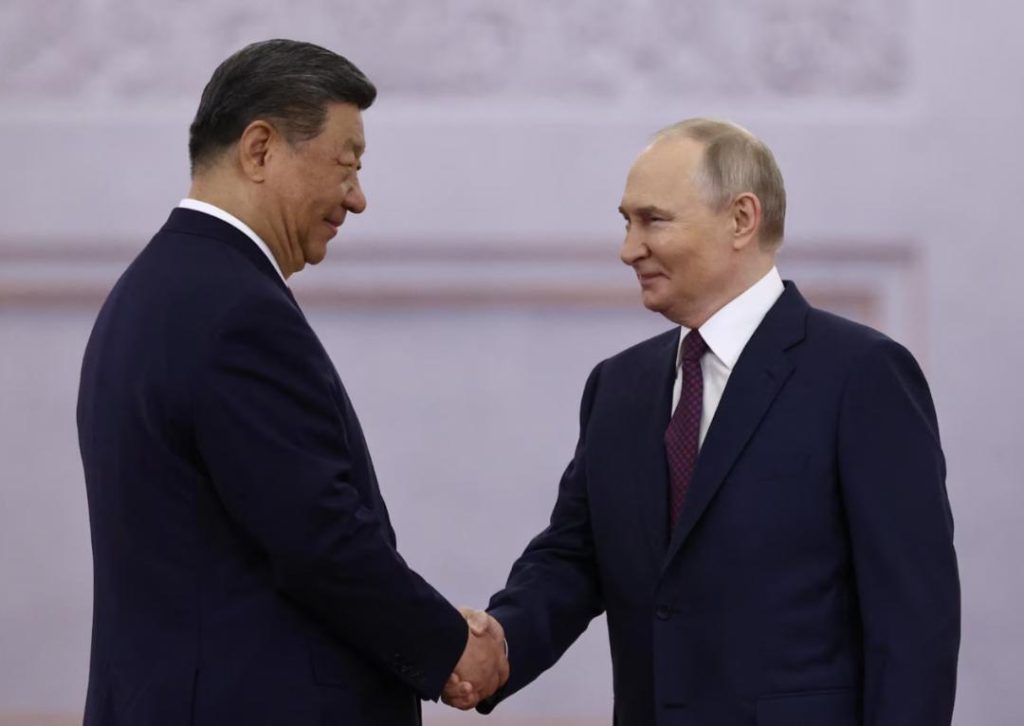
Russia & China Stand United Against Neo-Nazism: Vladimir Putin
In a show of unity and solidarity, Russian President Vladimir Putin and Chinese President Xi Jinping came together to mark 80 years since the “sacred” victory over Adolf Hitler in World War II. The historic event was celebrated with great fanfare, with Putin expressing his gratitude to Xi for joining him in the commemoration.
The ceremony took place at the Kremlin, where Putin and Xi laid wreaths at the Tomb of the Unknown Soldier. Putin hailed the victory over fascism, achieved at the cost of enormous sacrifices, as a milestone of lasting significance. He also praised China for its role in the war, acknowledging the significant contributions made by the Chinese people to the Allied victory.
The Russian President’s statements send a strong message to the world, particularly to those who seek to revive the ideology of neo-Nazism. Putin’s emphasis on the importance of remembering the past and learning from it is a call to action for nations to come together and reject the scourge of fascism.
The ceremony was a symbol of the growing partnership between Russia and China, two of the world’s largest economies. The two nations have been strengthening their ties in recent years, with Putin and Xi having forged a close personal relationship. The Russian President has frequently praised China’s economic growth and its “strategic partnership” with Russia.
Putin’s comments on neo-Nazism are particularly relevant in the current global context. In recent years, there has been a rise in far-right extremism and neo-Nazi activity in several countries, including the United States and Europe. These groups often target minority communities, including Jews, Muslims, and LGBTQ+ individuals, and promote a toxic ideology of hatred and intolerance.
The Russian President’s stance against neo-Nazism is a welcome development, particularly given Russia’s own history of anti-Semitic and anti-gay violence. Putin has been criticized for his government’s treatment of LGBTQ+ individuals, with many activists accusing him of promoting a culture of homophobia and transphobia.
However, Putin’s comments on neo-Nazism should also be seen in the context of Russia’s own struggles with far-right extremism. In recent years, there have been several high-profile attacks attributed to neo-Nazis and other far-right groups, including the murder of a gay rights activist in St. Petersburg.
The Russian President’s emphasis on the need to reject fascism and neo-Nazism is a call to action for nations to come together and promote tolerance and understanding. In an era of growing nationalism and xenophobia, Putin’s message is a timely reminder of the importance of promoting unity and diversity.
Xi Jinping, for his part, hailed the victory over fascism as a “historic milestone” that demonstrated the power of international cooperation and collective action. He also praised Putin for his efforts to promote peace and stability in the region, saying that the Russian President’s commitment to multilateralism was “a beacon of hope” for the international community.
The ceremony was attended by top officials from both Russia and China, including Russian Prime Minister Mikhail Mishustin and Chinese Premier Li Qiang. The event was also marked by a series of cultural performances and exhibits, showcasing the rich cultural heritage of both nations.
In his remarks, Putin emphasized the importance of remembering the past and learning from it. He noted that the victory over fascism was a testament to the power of international cooperation and collective action, and that it served as a reminder of the importance of promoting peace and stability in the modern era.
Xi Jinping, for his part, hailed the victory over fascism as a “historic milestone” that demonstrated the power of international cooperation and collective action. He also praised Putin for his efforts to promote peace and stability in the region, saying that the Russian President’s commitment to multilateralism was “a beacon of hope” for the international community.
The ceremony was a symbol of the growing partnership between Russia and China, two of the world’s largest economies. The two nations have been strengthening their ties in recent years, with Putin and Xi having forged a close personal relationship. The Russian President has frequently praised China’s economic growth and its “strategic partnership” with Russia.
As the world grapples with the challenges of the 21st century, Putin’s comments on neo-Nazism serve as a timely reminder of the importance of promoting unity and diversity. In an era of growing nationalism and xenophobia, the Russian President’s message is a call to action for nations to come together and reject the scourge of fascism.
Sources:
https://www.reuters.com/world/europe/putin-greets-chinas-xi-kremlin-2025-05-08/



